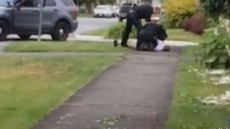TORONTO — Racially biased policing is destructive and counterproductive and should be stamped out immediately, the Ontario Human Rights Commission said Thursday.
In its annual report, the commission called on the Toronto police force to end carding — stopping and questioning people without any specific criminal investigative purpose — but said the practice is only part of a larger racism picture.
"Racial profiling has a deeply corrosive impact, especially on young black and indigenous men," the report states.
"When racial profiling happens, neighbourhoods become places of distrust and fear."
The commission's report comes amid ongoing controversy about carding. Although police deny any bias, the practice has drawn widespread condemnation for disproportionately targeting young black men.
On Wednesday, a black law student who has been stopped 30 times launched a charter challenge to carding. After initially defending it, Mayor John Tory recently called carding "toxic."
However, Mark Saunders, the force's new police chief who is black, says stopping and questioning people on the streets can enhance public safety. Such stops are "intelligence-based" and help investigate the "criminal element," he said.
"When it's done right, it is lawful," Saunders told CBC radio's Metro Morning Thursday.
In an interview, interim rights commissioner Ruth Goba said she hoped the mayor's change of heart may spur police to change their ways.
At the same time, she suggested, the Toronto Police Service has not been responsive to the commission's racial profiling concerns.
"We have given a lot of advice to the (service) and it hasn't been implemented in any meaningful way," Goba said.
The commission's report calls racial profiling by Toronto police "a recognized problem in need of an effective solution." It urges the police services board — which has essentially waffled and flip-flopped on the issue — to make major changes to carding or scrap the policy entirely.
At minimum, the commission says, police services need to:
— Guide and limit officer discretion to stop and question people
— Require officers to tell people they stop about their right to leave and not answer questions
— Collect race-based data to identify bias
— Provide transparency through receipts
— Purge carding data that lacks a non-discriminatory explanation
Goba said apart from developing comprehensive anti-bias policies and offering better training for officers, police services need to punish officers who indulge in racial profiling.
Among other things, the annual report also warns that discrimination against pregnant women or nursing mothers continues despite clear laws.
"We continue to see regular reports of women not getting hired or losing their jobs because they are pregnant, or getting fired when they take or return from a maternity leave," the report states.




